Starting February 2022, the Philippine Statistics Authority (PSA) released the rebased Consumer Price Index (CPI) for all income households to base year 2018, from base year 2012 as announced in the press release number 2022-01 dated 04 January 2022. The CPI series for all income households for January 2022 onwards will be 2018-based.
Inflation rate in Cebu City increased at 2.3 percent in June 2022
The inflation rate in Cebu City had increased from 1.5 percent in May 2022 to 2.3 percent in June 2022. Inflation rate in the city is lower than the inflation rate in Central Visayas at 5.7 percent in the same period. The average inflation in Cebu City from January to June 2022 remained at 2.0 percent. The inflation in June 2021 was lower at 1.3 percent compared to the inflation in June 2022.
(See Table A.)
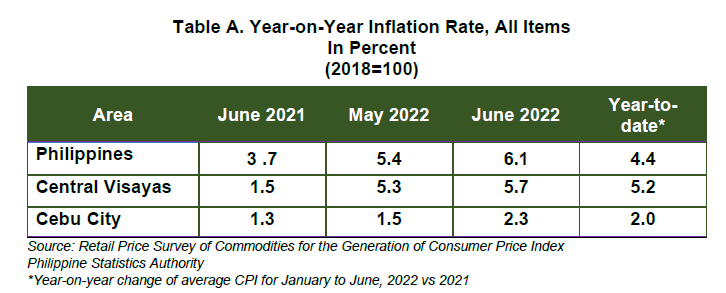
January 2022 had the highest inflation at 2.8 percent
An up and down movement of the inflation rate was observed in Cebu City from June 2021 to June 2022. The highest inflation was recorded in the month of January 2022 at 2.8 percent among months of the same period. (See Figure 1 and Table B.)

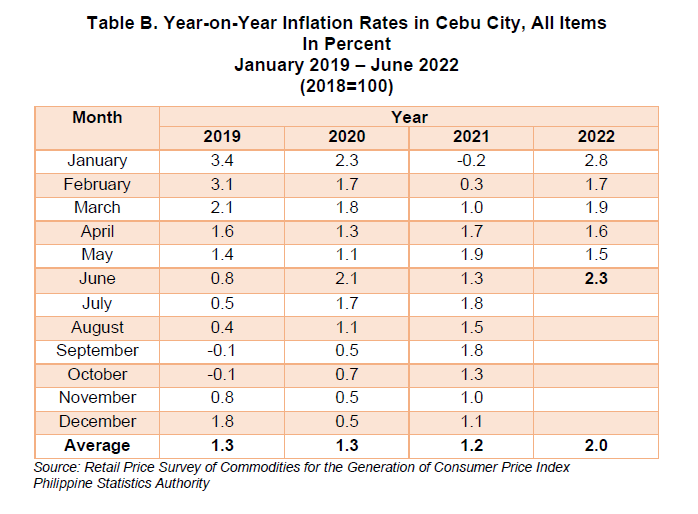
The increased in the inflation in Cebu City is driven by Transport
The acceleration in the inflation was mainly driven by the increase in the inflation of Transport index from 16.7 percent in May 2022 to 19.6 percent inflation in June 2022. Also, contributing to the upward trend was brought about the increase in the indices of the following commodity groups in June 2022:
Food and Non-Alcoholic Beverages, 0.8 percent
Clothing and Footwear, 0.1 percent
Health, 2.0 percent
Information and Communication, 0.7 percent
Recreation, Sport and Culture, 0.6 percent
Meanwhile, indices of the rest of the commodity groups retained their previous month’s inflation rates:
Furnishings, Household Equipment and Routine Maintenance of the House, 5.0 percent
Personal Care, and Miscellaneous Goods and Services, 0.3 percent
Indices among commodity groups: Education Services; Restaurants and Accommodation Services; and Financial Services posted a constant inflation at 0.0 percent.
On the contrary, decrease in the inflation both recorded in Housing, Water, Electricity, Gas and Other Fuels at 0.9 percent in June 2022, from 1.0 percent in May; and Alcoholic Beverages and Tobacco at 0.9 percent in June 2022, from 1.3 percent in May 2022. (See Table C.)
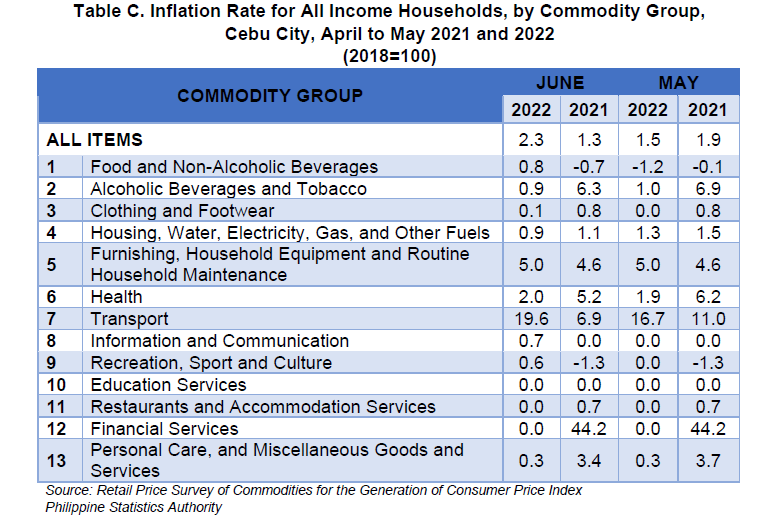
Cebu City’s CPI increased at 106.9 in June 2022
The Consumer Price Index (CPI) in Cebu City for the month of June 2022 increased at 106.9. Moreover, a higher index by 2.4 points is generated in June 2022 compared to generated from the same month in 2021. This month had posted the highest CPI in the city at 106.9 for the period June 2021 to June 2022. (See Figure 2.)
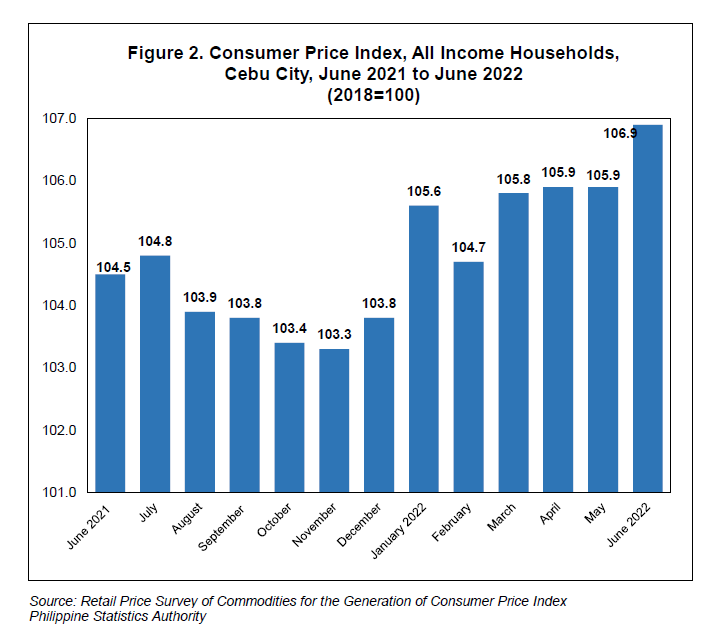
PPP in Cebu City remained at 0.94
Cebu City’s Purchasing Power of Peso (PPP) or real value of the peso remained constant at 0.94 centavos for June 2022, indicating that the value of Php1.00 in 2018 is only worth 0.94 centavos. (See Figure 3.)
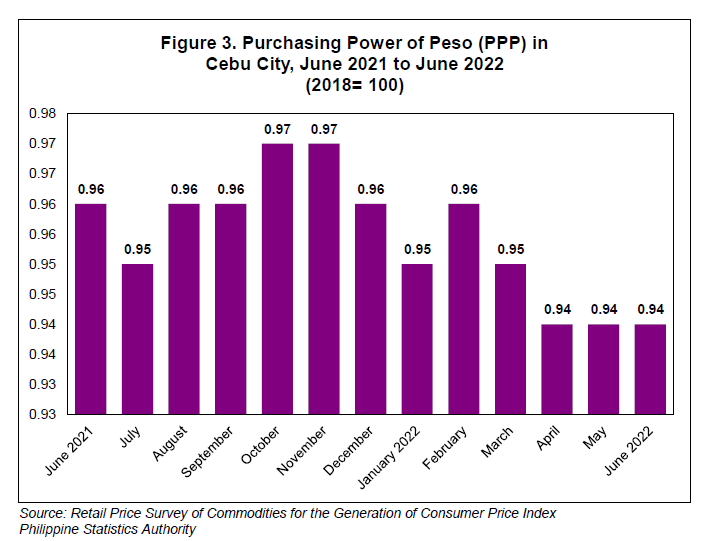
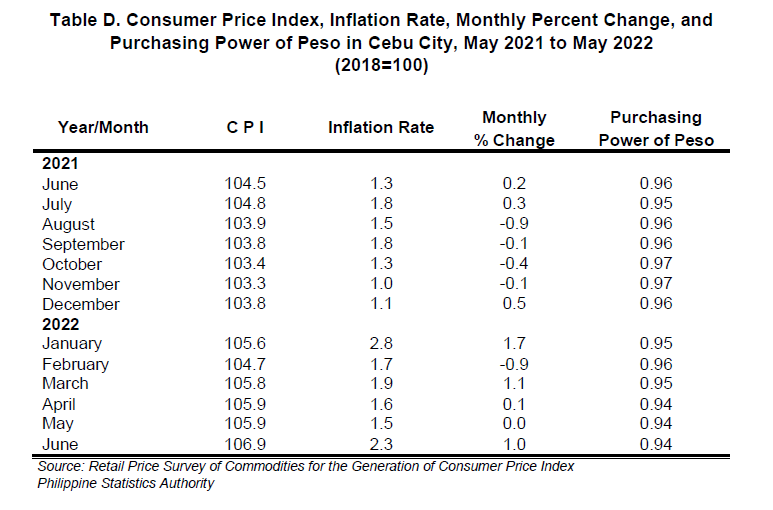
Technical Notes:
The Philippine Statistics Authority generates and announces the monthly Consumer Price Index (CPI) based on a nationwide survey of prices for a given basket of goods and services. Two important indicators, the inflation rate and purchasing power of the peso (PPP), are derived from the CPI which are important in monitoring price stability and the value of the country’s currency.
The Consumer Price Index (CPI) is an indicator of the change in the average retail prices of a fixed basket of goods and services commonly purchased by households relative to a base year.
Base Period/Base Year is the period, usually a year, at which the index number is set to 100. It is the reference point of the index number series.
Inflation Rate (IR) is equivalent to a decline in the purchasing power of the peso. It is the change in the CPI over a specific period of time (usually a month or a year). That is,

Where:
CPI1 - is the CPI in the previous period
CPI2 - is the CPI in the current period
The Purchasing Power of the Peso (PPP) is a measure of the real value of the peso in a given period relative to a chosen reference period. It is computed by getting the reciprocal of the CPI and multiplying the result by 100. That is,

Approved by:
(SGD) JUANILLA R. PREMNE
(Supervising Statistical Specialist)
Officer-in-Charge

